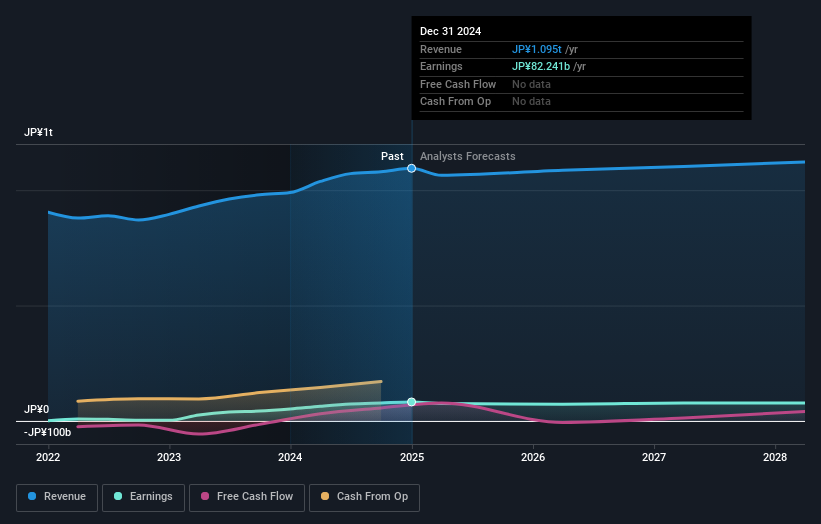- Japan
- /
- Transportation
- /
- TSE:9005
Individual investors account for 50% of Tokyu Corporation's (TSE:9005) ownership, while institutions account for 50%

Key Insights
- Tokyu's significant individual investors ownership suggests that the key decisions are influenced by shareholders from the larger public
- A total of 25 investors have a majority stake in the company with 48% ownership
- Institutions own 50% of Tokyu
If you want to know who really controls Tokyu Corporation (TSE:9005), then you'll have to look at the makeup of its share registry. And the group that holds the biggest piece of the pie are individual investors with 50% ownership. Put another way, the group faces the maximum upside potential (or downside risk).
Institutions, on the other hand, account for 50% of the company's stockholders. Insiders often own a large chunk of younger, smaller, companies while huge companies tend to have institutions as shareholders.
Let's delve deeper into each type of owner of Tokyu, beginning with the chart below.
Check out our latest analysis for Tokyu

What Does The Institutional Ownership Tell Us About Tokyu?
Institutional investors commonly compare their own returns to the returns of a commonly followed index. So they generally do consider buying larger companies that are included in the relevant benchmark index.
Tokyu already has institutions on the share registry. Indeed, they own a respectable stake in the company. This implies the analysts working for those institutions have looked at the stock and they like it. But just like anyone else, they could be wrong. When multiple institutions own a stock, there's always a risk that they are in a 'crowded trade'. When such a trade goes wrong, multiple parties may compete to sell stock fast. This risk is higher in a company without a history of growth. You can see Tokyu's historic earnings and revenue below, but keep in mind there's always more to the story.

Hedge funds don't have many shares in Tokyu. Our data shows that BlackRock, Inc. is the largest shareholder with 6.7% of shares outstanding. Nissay Asset Management Corporation is the second largest shareholder owning 4.1% of common stock, and Nomura Asset Management Co., Ltd. holds about 3.5% of the company stock.
On studying our ownership data, we found that 25 of the top shareholders collectively own less than 50% of the share register, implying that no single individual has a majority interest.
While studying institutional ownership for a company can add value to your research, it is also a good practice to research analyst recommendations to get a deeper understand of a stock's expected performance. There are plenty of analysts covering the stock, so it might be worth seeing what they are forecasting, too.
Insider Ownership Of Tokyu
The definition of an insider can differ slightly between different countries, but members of the board of directors always count. The company management answer to the board and the latter should represent the interests of shareholders. Notably, sometimes top-level managers are on the board themselves.
I generally consider insider ownership to be a good thing. However, on some occasions it makes it more difficult for other shareholders to hold the board accountable for decisions.
Our information suggests that Tokyu Corporation insiders own under 1% of the company. Keep in mind that it's a big company, and the insiders own JP¥435m worth of shares. The absolute value might be more important than the proportional share. It is good to see board members owning shares, but it might be worth checking if those insiders have been buying.
General Public Ownership
The general public, mostly comprising of individual investors, collectively holds 50% of Tokyu shares. This level of ownership gives investors from the wider public some power to sway key policy decisions such as board composition, executive compensation, and the dividend payout ratio.
Next Steps:
I find it very interesting to look at who exactly owns a company. But to truly gain insight, we need to consider other information, too. For instance, we've identified 2 warning signs for Tokyu that you should be aware of.
If you are like me, you may want to think about whether this company will grow or shrink. Luckily, you can check this free report showing analyst forecasts for its future.
NB: Figures in this article are calculated using data from the last twelve months, which refer to the 12-month period ending on the last date of the month the financial statement is dated. This may not be consistent with full year annual report figures.
Valuation is complex, but we're here to simplify it.
Discover if Tokyu might be undervalued or overvalued with our detailed analysis, featuring fair value estimates, potential risks, dividends, insider trades, and its financial condition.
Access Free AnalysisHave feedback on this article? Concerned about the content? Get in touch with us directly. Alternatively, email editorial-team (at) simplywallst.com.
This article by Simply Wall St is general in nature. We provide commentary based on historical data and analyst forecasts only using an unbiased methodology and our articles are not intended to be financial advice. It does not constitute a recommendation to buy or sell any stock, and does not take account of your objectives, or your financial situation. We aim to bring you long-term focused analysis driven by fundamental data. Note that our analysis may not factor in the latest price-sensitive company announcements or qualitative material. Simply Wall St has no position in any stocks mentioned.
About TSE:9005
Tokyu
Engages in the transportation, real estate, life services, and hotel and resort businesses in Japan and internationally.
Solid track record second-rate dividend payer.
Similar Companies
Market Insights
Community Narratives



